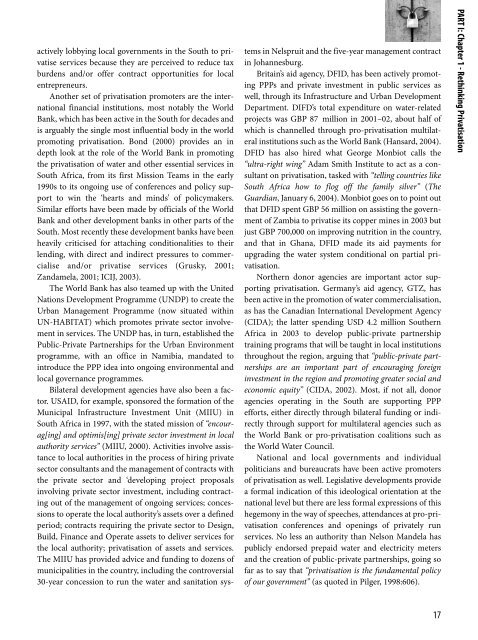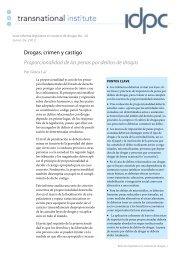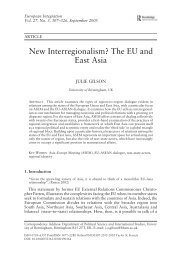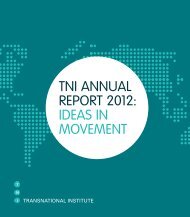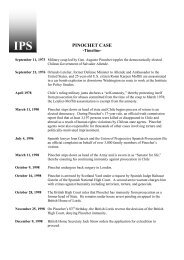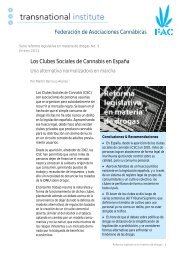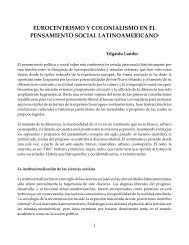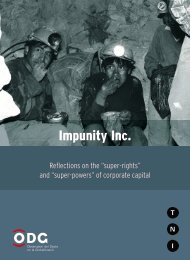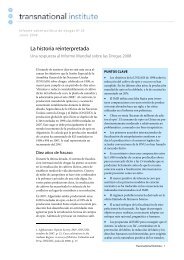Rethinking Privatization Towards a Critical Theoretical Perspective
Rethinking Privatization Towards a Critical Theoretical Perspective
Rethinking Privatization Towards a Critical Theoretical Perspective
Create successful ePaper yourself
Turn your PDF publications into a flip-book with our unique Google optimized e-Paper software.
actively lobbying local governments in the South to privatiseservices because they are perceived to reduce taxburdens and/or offer contract opportunities for localentrepreneurs.Another set of privatisation promoters are the internationalfinancial institutions, most notably the WorldBank, which has been active in the South for decades andis arguably the single most influential body in the worldpromoting privatisation. Bond (2000) provides an indepth look at the role of the World Bank in promotingthe privatisation of water and other essential services inSouth Africa, from its first Mission Teams in the early1990s to its ongoing use of conferences and policy supportto win the ‘hearts and minds’ of policymakers.Similar efforts have been made by officials of the WorldBank and other development banks in other parts of theSouth. Most recently these development banks have beenheavily criticised for attaching conditionalities to theirlending, with direct and indirect pressures to commercialiseand/or privatise services (Grusky, 2001;Zandamela, 2001; ICIJ, 2003).The World Bank has also teamed up with the UnitedNations Development Programme (UNDP) to create theUrban Management Programme (now situated withinUN-HABITAT) which promotes private sector involvementin services. The UNDP has, in turn, established thePublic-Private Partnerships for the Urban Environmentprogramme, with an office in Namibia, mandated tointroduce the PPP idea into ongoing environmental andlocal governance programmes.Bilateral development agencies have also been a factor.USAID, for example, sponsored the formation of theMunicipal Infrastructure Investment Unit (MIIU) inSouth Africa in 1997, with the stated mission of “encourag[ing]and optimis[ing] private sector investment in localauthority services” (MIIU, 2000). Activities involve assistanceto local authorities in the process of hiring privatesector consultants and the management of contracts withthe private sector and ‘developing project proposalsinvolving private sector investment, including contractingout of the management of ongoing services; concessionsto operate the local authority’s assets over a definedperiod; contracts requiring the private sector to Design,Build, Finance and Operate assets to deliver services forthe local authority; privatisation of assets and services.The MIIU has provided advice and funding to dozens ofmunicipalities in the country, including the controversial30-year concession to run the water and sanitation systemsin Nelspruit and the five-year management contractin Johannesburg.Britain’s aid agency, DFID, has been actively promotingPPPs and private investment in public services aswell, through its Infrastructure and Urban DevelopmentDepartment. DIFD’s total expenditure on water-relatedprojects was GBP 87 million in 2001–02, about half ofwhich is channelled through pro-privatisation multilateralinstitutions such as the World Bank (Hansard, 2004).DFID has also hired what George Monbiot calls the“ultra-right wing” Adam Smith Institute to act as a consultanton privatisation, tasked with “telling countries likeSouth Africa how to flog off the family silver” (TheGuardian, January 6, 2004). Monbiot goes on to point outthat DFID spent GBP 56 million on assisting the governmentof Zambia to privatise its copper mines in 2003 butjust GBP 700,000 on improving nutrition in the country,and that in Ghana, DFID made its aid payments forupgrading the water system conditional on partial privatisation.Northern donor agencies are important actor supportingprivatisation. Germany’s aid agency, GTZ, hasbeen active in the promotion of water commercialisation,as has the Canadian International Development Agency(CIDA); the latter spending USD 4.2 million SouthernAfrica in 2003 to develop public-private partnershiptraining programs that will be taught in local institutionsthroughout the region, arguing that “public-private partnershipsare an important part of encouraging foreigninvestment in the region and promoting greater social andeconomic equity” (CIDA, 2002). Most, if not all, donoragencies operating in the South are supporting PPPefforts, either directly through bilateral funding or indirectlythrough support for multilateral agencies such asthe World Bank or pro-privatisation coalitions such asthe World Water Council.National and local governments and individualpoliticians and bureaucrats have been active promotersof privatisation as well. Legislative developments providea formal indication of this ideological orientation at thenational level but there are less formal expressions of thishegemony in the way of speeches, attendances at pro-privatisationconferences and openings of privately runservices. No less an authority than Nelson Mandela haspublicly endorsed prepaid water and electricity metersand the creation of public-private partnerships, going sofar as to say that “privatisation is the fundamental policyof our government” (as quoted in Pilger, 1998:606).PART I: Chapter 1 - <strong>Rethinking</strong> Privatisation17


